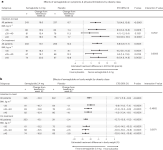AASraw-Cherry
Sponsor
Heart failure with preserved ejection fraction is increasing in prevalence and is associated with a high symptom burden and functional impairment, especially in persons with obesity. No therapies have been approved to target obesity-related heart failure with preserved ejection fraction.
The study----Semaglutide in Patients with Heart Failure with Preserved Ejection Fraction and Obesity
has found that semaglutide may also be helpful in patients with heart failure with preserved ejection fraction and obesity.
The results demonstrated that semaglutide treatment led to significant improvements compared to the placebo group. Semaglutide was associated with a larger mean change in KCCQ-CSS (16.6 points with semaglutide vs. 8.7 points with placebo), a greater mean percentage change in body weight (-13.3% with semaglutide vs. -2.6% with placebo), and an increased mean change in the 6-minute walk distance (21.5 m with semaglutide vs. 1.2 m with placebo). The analysis of the hierarchical composite endpoint also favored semaglutide.
Furthermore, the study reported a substantial decrease in CRP levels with semaglutide compared to the placebo. Serious adverse events were less frequently reported in the semaglutide group.
In conclusion, in patients with HFpEF and obesity, treatment with semaglutide (2.4 mg) resulted in significant reductions in symptoms and physical limitations, improved exercise function, and greater weight loss compared to placebo.

[h=1]Fig. 1: Effects of semaglutide compared to placebo across different obesity classes on HF symptoms, physical limitations and body weight.<o ></o
></o >[/h]From: Semaglutide in HFpEF across obesity class and by body weight reduction: a prespecified analysis of the STEP-HFpEF trial<o
>[/h]From: Semaglutide in HFpEF across obesity class and by body weight reduction: a prespecified analysis of the STEP-HFpEF trial<o ></o
></o >
>
The study----Semaglutide in Patients with Heart Failure with Preserved Ejection Fraction and Obesity
has found that semaglutide may also be helpful in patients with heart failure with preserved ejection fraction and obesity.
The results demonstrated that semaglutide treatment led to significant improvements compared to the placebo group. Semaglutide was associated with a larger mean change in KCCQ-CSS (16.6 points with semaglutide vs. 8.7 points with placebo), a greater mean percentage change in body weight (-13.3% with semaglutide vs. -2.6% with placebo), and an increased mean change in the 6-minute walk distance (21.5 m with semaglutide vs. 1.2 m with placebo). The analysis of the hierarchical composite endpoint also favored semaglutide.
Furthermore, the study reported a substantial decrease in CRP levels with semaglutide compared to the placebo. Serious adverse events were less frequently reported in the semaglutide group.
In conclusion, in patients with HFpEF and obesity, treatment with semaglutide (2.4 mg) resulted in significant reductions in symptoms and physical limitations, improved exercise function, and greater weight loss compared to placebo.

[h=1]Fig. 1: Effects of semaglutide compared to placebo across different obesity classes on HF symptoms, physical limitations and body weight.<o

